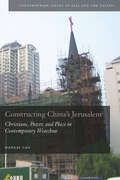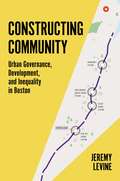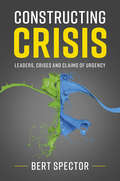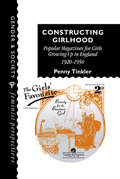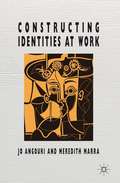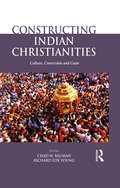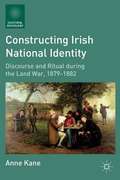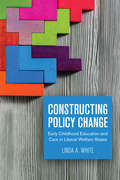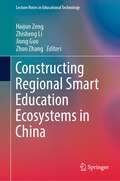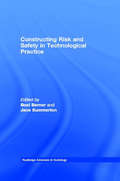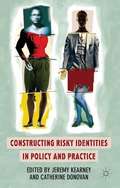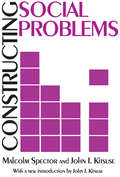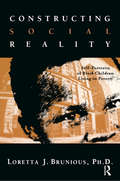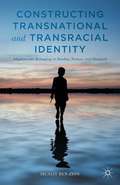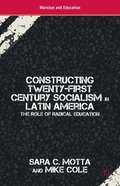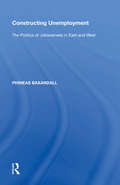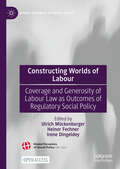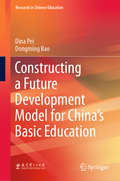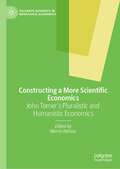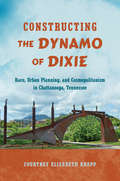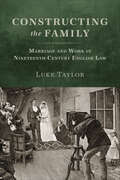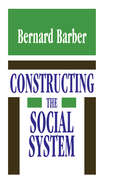- Table View
- List View
Constructing China's Jerusalem: Christians, Power, and Place in Contemporary Wenzhou
by Nanlai CaoDrawing on extensive ethnographic fieldwork and in-depth life history interviews, this illuminating book provides an intimate portrait of contemporary Chinese Christianity in the context of a modern, commercialized economy. In vivid detail, anthropologist Nanlai Cao explores the massive resurgence of Protestant Christianity in the southeastern coastal city of Wenzhou--popularly referred to by its residents as "China's Jerusalem"--a nationwide model for economic development and the largest urban Christian center in China. Cao's study of Chinese Christians delves into the dynamics of activities such as banqueting, network building, property acquisition, mate selection, marriage ritual, migrant work, and education. Unlike previous research that has mainly looked at older, rural, and socially marginalized church communities, Cao trains his focus on economically powerful, politically connected, moralizing Christian entrepreneurs. In framing the city of Wenzhou as China's Jerusalem, newly rich Chinese Christians seek not only to express their leadership aspirations in a global religious movement but also to assert their place, identity, and elite status in post-reform Chinese society.
Constructing Communities in the Late Roman Countryside
by Cam GreyThis book is the first comprehensive treatment of the 'small politics' of rural communities in the Late Roman world. It places the diverse fates of those communities within a generalized model for exploring rural social systems. Fundamentally, social interactions in rural contexts in the period revolved around the desire of individual households to insure themselves against catastrophic subsistence failure and the need of the communities in which they lived to manage the attendant social tensions, inequalities and conflicts. A focus upon the politics of reputation in those communities provides a striking contrast to the picture painted by the legislation and the writings of Rome's literate elite: when viewed from the point of view of the peasantry, issues such as the Christianization of the countryside, the emergence of new types of patronage relations, and the effects of the new system of taxation upon rural social structures take on a different aspect.
Constructing Community: Urban Governance, Development, and Inequality in Boston
by Jeremy R. LevineA look at the benefits and consequences of the rise of community-based organizations in urban developmentWho makes decisions that shape the housing, policies, and social programs in urban neighborhoods? Who, in other words, governs? Constructing Community offers a rich ethnographic portrait of the individuals who implement community development projects in the Fairmount Corridor, one of Boston’s poorest areas. Jeremy Levine uncovers a network of nonprofits and philanthropic foundations making governance decisions alongside public officials—a public-private structure that has implications for democratic representation and neighborhood inequality.Levine spent four years following key players in Boston’s community development field. While state senators and city councilors are often the public face of new projects, and residents seem empowered through opportunities to participate in public meetings, Levine found a shadow government of nonprofit leaders and philanthropic funders, nonelected neighborhood representatives with their own particular objectives, working behind the scenes. Tying this system together were political performances of “community”—government and nonprofit leaders, all claiming to value the community. Levine provocatively argues that there is no such thing as a singular community voice, meaning any claim of community representation is, by definition, illusory. He shows how community development is as much about constructing the idea of community as it is about the construction of physical buildings in poor neighborhoods.Constructing Community demonstrates how the nonprofit sector has become integral to urban policymaking, and the tensions and trade-offs that emerge when private nonprofits take on the work of public service provision.
Constructing Crisis: Leaders, Crises and Claims of Urgency
by Bert SpectorThere is no such thing as a crisis. Rather than an actual, corporeal thing, a crisis is a claim asserted from a position of power and influence, intended to shape the understanding of others. A constructed crisis by a leader may or may not be legitimate, and, legitimate or not, the content of a claim alone does not determine whether people decide to believe it. Rather than viewing crises as the result of objective events, Spector demonstrates that leaders impose crises on organizations to strategically assert power and exert control. Interpreting crisis through a critical lens, this interdisciplinary book encompasses not just management and organizational literature, but also sociology, history, cognitive science, and psychology. The resulting wide-ranging, critical, and provocative analysis will appeal in particular to students and academics researching leadership and crisis management.
Constructing Girlhood: Popular Magazines For Girls Growing Up In England, 1920-1950
by Penny TinklerThis text explores the contribution of magazines to the social construction of female adolescence during a historical period of rapid change and locates the role of magazines in the lives of contemporary girls. In addressing this theme, the book explores the changing social, economic, political and cultural conditions which shaped, and continue to influence, the experience of girlhood. The author discusses key concepts such as adolescence and "girlhood" and outlines theories concerning the interpretation of gender relations, cultural production, meaning and reading.; The chapters use life-course events and changes such as schooling, work, entrance into relationships, marriage and motherhood as their main themes. The author discusses the importance attached to age and social class for the form and content of the magazines and explores the interlinked factors which contributed to decisions about what were legitimate concerns for girls - for example, publisher's objectives and culture; reader interests; and ideologies of femininity. The final chapter outlines the patterns of leisure consumption in this era, providing insights into the changing role of leisure in today's society.
Constructing Identities at Work
by Jo Angouri Meredith MarraThrough language we show who we are and where we belong. In the workplace context this includes the way we construct ourselves as the team leader, meeting chair, a good colleague, the judge, a teacher orresearcher. Constructing Identities at Work presents cutting edge research on the process of identity construction in professional and institutional contexts, from corporate workplaces, to courtrooms, classrooms, and academia. The authors illustrate the range of foci, methodologies and approaches prevalent in the newly established field of workplace discourse, demonstrating how interactants do identity work and how identity is 'indexed' (often in subtle ways) in workplace discourse. Moving beyond unhelpful static universalities about how all women, all English-speakers, or all old people behave linguistically, each of the authors emphasises the contextualised nature of our everyday lives and the ways in which we negotiate and renegotiate our emerging identities with others. Among the chapters there are examples of a range of different theoretical approaches to identity in linguistics, from the prevalent social constructionist lens to the micro-level detail accessible through Conversation Analysis, and the quantitative analysis offered by corpus linguistics.
Constructing Indian Christianities: Culture, Conversion and Caste
by Chad M. Bauman Richard Fox YoungThis volume offers insights into the current ‘public-square’ debates on Indian Christianity. Drawing on ethnographic fieldwork as well as rigorous analyses, it discusses the myriad histories of Christianity in India, its everyday practice and contestations and the process of its indigenisation. It addresses complex and pertinent themes such as Dalit Indian Christianity, diasporic nationalism and conversion. The work will interest scholars and researchers of religious studies, Dalit and subaltern studies, modern Indian history, and politics.
Constructing Irish National Identity
by Anne KaneA major statement in both historical and cultural sociology, "Constructing Irish Nationalist Identity: Ritual and Discourse during the Land War, 1879-1882," provides a theoretical and methodological model for analyzing symbolic and social transformation in major historical events. Synthesizing the strong program in cultural sociology with eventful temporality, Anne Kane demonstrates the construction of political alliance and the emergence of a counter hegemonic cultural structure over the course of a political movement and campaign. Through deep analysis of the discursive struggles of contentious participants - tenant farmers, nationalists, and the Irish Catholic Church - in the multitudinous enchained ritualistic events of the Irish Land War, Kane illuminates the construction of a reconfigured Irish Nationalist Identity.
Constructing Policy Change: Early Childhood Education and Care in Liberal Welfare States
by Linda WhiteIn Constructing Policy Change, Linda A. White examines the expansion of early childhood education and care (ECEC) policies and programs in liberal welfare states, including Australia, Canada, New Zealand, the UK, and the USA. In the first part of the book, the author investigates the sources of policy ideas that triggered ECEC changes in various national contexts. This is followed by a close analysis of cross-national variation in the implementation of ECEC policy in Canada and the USA. White argues that the primary mechanisms for policy change are grounded in policy investment logics as well as cultural logics: that is, shifts in public sentiments and government beliefs about the value of ECEC policies and programs are rooted in both evidence-based arguments and in principled beliefs about the policy. A rich, nuanced examination of the reasons motivating ECEC policy expansion and adoption in different countries, Constructing Policy Change is a corrective to the comparative welfare state literature that focuses on political interest alone.
Constructing Race
by Tracy TeslowConstructing Race helps unravel the complicated and intertwined history of race and science in America. Tracy Teslow explores how physical anthropologists in the twentieth century struggled to understand the complexity of human physical and cultural variation, and how their theories were disseminated to the public through art, museum exhibitions, books, and pamphlets. In their attempts to explain the history and nature of human peoples, anthropologists persistently saw both race and culture as critical components. This is at odds with a broadly accepted account that suggests racial science was fully rejected by scientists and the public following World War II. This book offers a corrective, showing that both race and culture informed how anthropologists and the public understood human variation from 1900 through the decades following the war. The book offers new insights into the work of Franz Boas, Ruth Benedict, and Ashley Montagu, as well as less well-known figures, including Harry Shapiro, Gene Weltfish, and Henry Field.
Constructing Regional Smart Education Ecosystems in China (Lecture Notes in Educational Technology)
by Haijun Zeng Zhisheng Li Jiong Guo Zhuo ZhangThis book enriches the understanding of regional smart education in China and promotes sharing of smart education case studies in China and abroad. It presents 46 case studies selected from a total of 644 case studies collected nationwide in China. These selected case studies focus on regional construction, research findings, and solutions. The case studies on regional construction mainly focus on the sustainable development mechanism of regional smart education. The research findings case studies showcase research results produced by research teams and individuals, which involve theories, models, technologies, practical investigations, or international comparisons related to smart education. Lastly, the solution case studies are technical solutions provided by enterprises for the development of smart education, which include application scenarios, methods, and effects in regions or schools around smart educational equipment, platforms, networks, tools, resources, or integrated solutions.
Constructing Risk and Safety in Technological Practice (Routledge Advances in Sociology #Vol. 4)
by Boel Berner Jane SummertonModern technological systems entail risks and uncertainties of hitherto unknown dimensions. This book discusses the construction of risk and safety within a variety of empirical contexts where technologies and their risk are debated and handled by individuals, groups or organizations. With contributions from leading scholars from Europe and the USA, it presents original theoretical discussions, linked to detailed empirical case studies.
Constructing Risky Identities in Policy and Practice
by Jeremy Kearney Catherine DonovanThis collection explores how the dominant risk agenda is being embedded across welfare policy and practice contexts in order to redefine social problems and those who experience them. Identities of 'risky' or 'safe', 'responsible' or 'irresponsible' are being increasingly applied, not only to everyday life but also to professional practice.
Constructing Social Problems
by John I. Kitsuse Malcolm SpectorThere is no adequate definition of social problems within sociology, and there is not and never has been a sociology of social problems. That observation is the point of departure of this book. The authors aim to provide such a definition and to prepare the ground for the empirical study of social problems. They are aware that their objective will strike many fellow sociologists as ambitious, perhaps even arrogant. Their work challenges sociologists who have, over a period of fifty years, written treatises on social problems, produced textbooks cataloguing the nature, distribution, and causes of these problems, and taught many sociology courses. It is only natural that the authors' work will be viewed as controversial in light of the large literature which has established a "sociology of" a wide range of social problems-the sociology of race relations, prostitution, poverty, crime, mental illness, and so forth. In the 1970s when the authors were preparing for a seminar on the sociology of social problems, their review of the "literature" revealed the absence of any systematic, coherent statement of theory or method in the study of social problems. For many years the subject was listed and offered by university departments of sociology as a "service course" to present undergraduates with what they should know about the various "social pathologies" that exist in their society. This conception of social problems for several decades has been reflected in the substance and quality of the literature dominated by textbooks. In 'Constructing Social Problems', the authors propose that social problems be conceived as the claims-making activities of individuals or groups regarding social conditions they consider unjust, immoral, or harmful and that should be addressed. This perspective, as the authors have formulated it, conceives of social problems as a process of interaction that produces social problems as social facts in society. The authors further propose that this process and the social facts it produces are the data to be researched for the sociology of social problems. This volume will be of interest to those concerned with the discipline of sociology, especially its current theoretical development and growth.
Constructing Social Reality: Self Portraits of Poor Black Adolescents
by Loretta BruniousThis book examines how black children who grow up in an impoverished environment construct their social reality, and why this process is a particulary critical factor in their perception and creation of self. It argues that black disadvantaged children develop a lifestyle and adopt values based on an identity grounded in racism, inequality, violence and poverty. "Constructing Social Relaity: Self Portraits of poor Black Adolescents" makes a valuable contribution to the scholarship by investigating the phenomena of poverty from cognitive, linguistic, and experiential persepctives in the lives of disadvantaged black adolescents.
Constructing Transnational and Transracial Identity
by Sigalit Ben-ZionNorway, Sweden, and Denmark are home to more than 90,000 transnational adoptees of Scandinavian parents raised in a predominantly white environment. This ethnography provides a unique perspective on how these transracial adoptees conceptualize and construct their sense of identity along the intersection of ethnicity, family, and national lines.
Constructing Twenty-First Century Socialism in Latin America
by Mike Cole Sara C. MottaIn Constructing Twenty-First Century Socialism: The Role of Radical Education, Motta and Cole explore the role of the politics of knowledge and pedagogy in the reinvention of socialism for the twenty-first century. Through a critical analysis of Brazil, Colombia and Venezuela they deconstruct the mechanisms of neoliberal control as an epistemological project of monologue, closure, and violence against all 'others'. The authors develop an affirmative engagement with the traditions, practices, and politics which seek to challenge this closure through the policies of the counter-hegemonic government of Venezuela, the struggles of social movements in Brazil and Colombia, and the daily resistance of critical educators working in formal educational settings in all three countries. This mapping and analysis not only contribute to struggles for alternatives to capitalism in Latin America, but are translatable to other contexts. The book theorizes that with the exhaustion of neoliberalism, it is time to pedagogize the political and politicize the pedagogical in order to create worlds beyond capitalism.
Constructing Unemployment: The Politics of Joblessness in East and West
by Phineas BaxandallAs the longest economic boom in history has given way to leaner times, unemployment has re-emerged as a major issue. This theoretically and empirically sophisticated book examines how unemployment takes on widely different political meanings and explores the ways in which governments act to change their own accountability for unemployment. It contributes to the comparative political economy literature that analyzes political responses to economic problems. Baxandall reverses a conventional application of comparative research by using an Eastern European case to reveal political dynamics that are mirrored in the West - as demonstrated with American and Western European cases. Using interviews and previously unexplored archives to consider a dramatic transformation in the meaning of unemployment in Hungary, he demonstrates how the politics of economic change depend crucially on the political re-crafting of economic categories.
Constructing Worlds of Labour: Coverage and Generosity of Labour Law as Outcomes of Regulatory Social Policy (Global Dynamics of Social Policy)
by Irene Dingeldey Ulrich Mückenberger Heiner FechnerThis open access book simultaneously addresses both the segmenting and the egalitarian function of individual labour law, in almost all countries of the world, in some chapters following up from its origin to the present. Its socio-legal approach fills gaps for sociological, legal and historical research of regulatory social policy. Labour law is dealt with both in qualitative (theoretical, hermeneutic and historical) and in quantitative manner (with the leximetrics method developing new ways to measure generosity and coverage of law). This is a groundbreaking contribution to regulatory social policy research. By indicating the relevance and the mechanisms of legal segmentation for labour market segmentation, unequal opportunities and social stratification it provides evidence for the assumptions that social segmentation does not only stem from market forces, but also from the law itself. Even the rising impact of egalitarian law cannot fully cope with legal segmentation. The book chapters place particular emphasis on the development in countries of the Global South.
Constructing a Future Development Model for China’s Basic Education (Research in Chinese Education)
by Dina Pei Dongming BaoFocusing on the future development of basic education in China, and on overcoming related issues, this book identifies key breakthroughs, priorities and important fields of basic education reform. In addition, it introduces the “Three Power Model” – decision-making, principals’ leadership, and learning power – to help address the challenges of future development.Unlike much of the research on basic education reform, the book draws on a forward-thinking, realistic and comprehensive project: bringing together 15 universities and research institutes, 16 provincial administration departments, and 100 selected primary and secondary schools, it has also been strongly endorsed by the nation’s leaders. After five years of practice and innovation, it has made significant breakthroughs in many provinces. Sharing unique insights into the project and its outcomes, the book offers an invaluable asset for education researchers, primary and secondary school teachers, and anyone interested in the evolution of basic education in China.
Constructing a More Scientific Economics: John Tomer's Pluralistic and Humanistic Economics (Palgrave Advances in Behavioral Economics)
by Morris AltmanJohn Tomer was a leading intellectual figure in behavioural economics, making distinct contributions to the theory of the firm, social economy, choice theory, and government policy. His underlying methodology as an economist was to incorporate different disciplinary approaches to the subject at hand, whilst maintaining an underlying respect and understanding of how and why humans behave the way they do. This book brings together a collection of scholars celebrating John Tomer’s contributions to the field of economics. Covering key areas of his research, contributing authors discuss the latest research in behavioral economics, the human firm, climate change policy, sustainability, well-being, human capital, and human development. This volume, extending John Tomer’s more scientific perspective rooted in behavioural and institutional economics, should find an audience among both scholars and policy advocates. It can also enrich course delivery, providing students with alternative perspectives and approach to economic and socio-economic analysis.
Constructing a Social Welfare System for All in China (Routledge Studies on the Chinese Economy)
by China Development Research FoundationChina Development Research Foundation is one of the leading economic think tanks in China, where many of the details of China’s economic reform have been formulated. Its work and publications therefore provide great insights into what the Chinese themselves think about economic reform and how it should develop. This book sets out the general objectives, principles and framework of a proposed new social welfare system for China, putting forward relevant policy recommendations. It provides a comprehensive overview of China’s current welfare services, including retirement pensions, education, health, employment, housing and social security payments, and goes on to cost the proposed new social welfare system and assess the government’s capacity for implementing it. It shows how the new system will, within an integrated framework, provide comprehensive welfare for all, including rural and urban citizens, migrant workers and disadvantaged groups such as rural and urban poor. It also shows how the new system will aim to balance economic and social development whilst maintaining China’s high economic growth rate, increasing domestic demand and promoting economic restructuring.
Constructing the Dynamo of Dixie: Race, Urban Planning, and Cosmopolitanism in Chattanooga, Tennessee
by Courtney Elizabeth KnappWhat can local histories of interracial conflict and collaboration teach us about the potential for urban equity and social justice in the future? Courtney Elizabeth Knapp chronicles the politics of gentrification and culture-based development in Chattanooga, Tennessee, by tracing the roots of racism, spatial segregation, and mainstream "cosmopolitanism" back to the earliest encounters between the Cherokee, African Americans, and white settlers. For more than three centuries, Chattanooga has been a site for multiracial interaction and community building; yet today public leaders have simultaneously restricted and appropriated many contributions of working-class communities of color within the city, exacerbating inequality and distrust between neighbors and public officials. Knapp suggests that "diasporic placemaking"—defined as the everyday practices through which uprooted people create new communities of security and belonging—is a useful analytical frame for understanding how multiracial interactions drive planning and urban development in diverse cities over time. By weaving together archival, ethnographic, and participatory action research techniques, she reveals the political complexities of a city characterized by centuries of ordinary resistance to racial segregation and uneven geographic development.
Constructing the Family: Marriage and Work in Nineteenth-Century English Law
by Luke TaylorIn nineteenth-century England, legal conceptions of work and family changed in fundamental ways. Notably, significant legal moves came into play that changed the legal understanding of the family. Constructing the Family examines the evolution of the legal-discursive framework governing work and family relations. Luke Taylor considers the intersecting intellectual and institutional forces that contributed to the dissolution of the household, the establishment of separate spheres of work and family, and the emergence of modern legal and social ideas concerning work and family. He shows how specific legal-institutional moves contributed to the creation of the family’s categorical status in the social and legal order and a distinct and exceptional body of rules – Family Law – for its governance. Shedding light on the historical processes that contributed to the emergence of English Family Law, Constructing the Family shows how work and family became separate regulatory domains, and in so doing reveals the contingent nature of the modern legal family.
Constructing the Social System
by Bernard BarberBarber constructs a provisional, generalized, substantive theory of the social system, which he uses as the starting point and focus of his specialized researches. In this collection of his major writings in social system theory, Barber shows how he has used and developed such a framework over the last fifty years and demonstrates the application o
